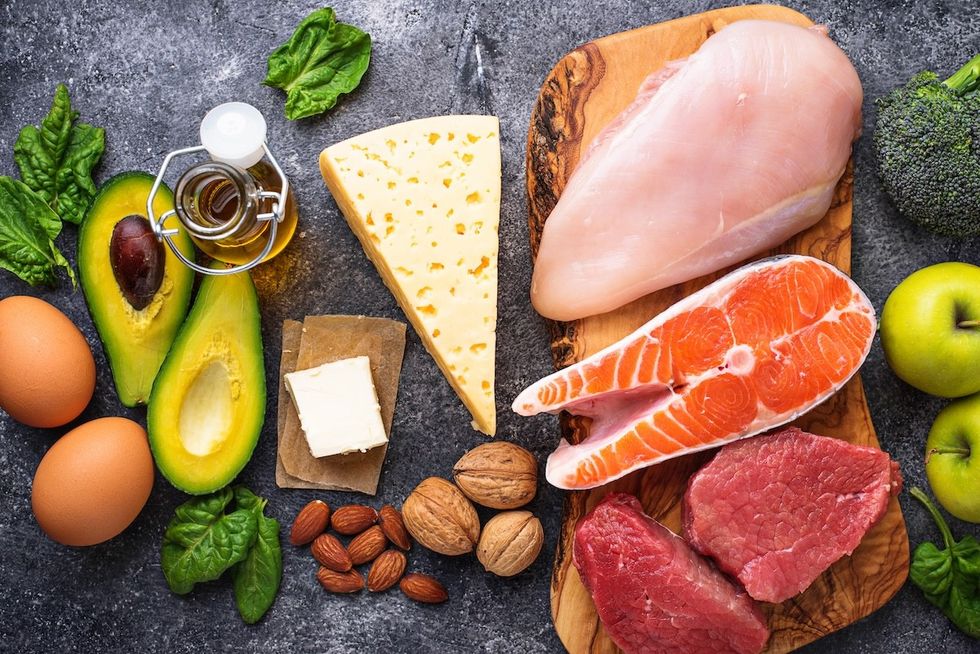Getting rid of belly fat is important for more than just aesthetics—fat that builds around your middle is a particularly dangerous type of fat, not just because it’s metabolically active, but because abdominal fat is linked to a host of concerning health conditions. Getting rid of belly fat can be tricky because you really do have to focus on overall weight loss for long-term success, and you can’t spot-reduce through exercise. What you can do is boost fat-burning with a very simple diet change—here’s what the experts say.
RELATED: 7 Ways to Lose “Unhealthy” Visceral Fat.
Low-Carb Diets and Belly Fat
Shutterstock
Studies show a low-carb diet is effective for helping get rid of belly fat. “Low-carb nutrition lowers insulin, improves metabolic syndrome, and can put type 2 diabetes in remission,” says board-certified cardiologist and lipidologist Bret Scher, MD, via Diet Doctor. “It can also help people lose belly fat… Many diets that promote weight loss, including vegan diets and chronic caloric restriction, can help people lose belly fat. However, the key is finding a sustainable diet that provides adequate nutrition and still helps you lose belly fat. For many, a low-carb diet may be an effective option, and adding intermittent fasting is also promising.”
Low Carb Is Not No-Carb

When discussing a “low-carb diet”, some may assume this means NO carbs, but this is not the case. What you need to focus on are high-fiber, low-starch carbs like green vegetables. “Numerous studies have shown that reducing carb intake is a very effective way to lose belly fat,” says Internal Medicine Physician Dr. Jennifer Hubert. “Low-carb diets focus not only on reducing carb intake but also replacing simple carbs (like refined sugar) with complex carbs, like vegetables and whole grains. Simple carbs are low in fiber, high in sugar, and are digested quicker than complex carbs. In contrast, complex carbs are high in fiber and low in sugar, which helps you feel more satisfied after eating and stay fuller for longer. Low-carb diets have been shown to successfully reduce visceral fat even without calorie restriction.”
More Specific Fat Loss
Shutterstock
The ideal diet is one that prioritizes fat-burning while preserving lean muscle. Johns Hopkins researchers found that those who tried a low-carb diet lost an average of 10 pounds more than those on a low-fat diet (28.9 pounds for the low-carbers and 18.7 pounds for the low-fat people). Both groups took in the same amount of calories.
RELATED: The Best Snacks for Burning Belly Fat.
Long-Term Success

The success of a low-carb diet depends on whether it’s something you can commit to long-term. “The research we have to date shows that adhering to either a low or very-low carb diet plan can lead to significant weight loss,” says Dariush Mozaffarian, dean of the Friedman School of Nutrition Science and Policy, via the Tufts Newsletter. “For some people, the restrictions, lower variety, and potential exclusion of favorite foods can make low carb diets harder to follow for the long term.”
Health Benefits

The health benefits of a low-carb diet go beyond weight loss. “Lowering carb intake, especially from processed sources, slows down the speed and amount of these fuels entering the bloodstream,” says Mozaffarian. “This has many health benefits. Reducing intake of processed grains and sugars, and replacing these with minimally processed foods like nuts, seeds, vegetables, and plant oils rich in unsaturated fats is a great choice for long-term weight control, metabolic health, and general health.”


